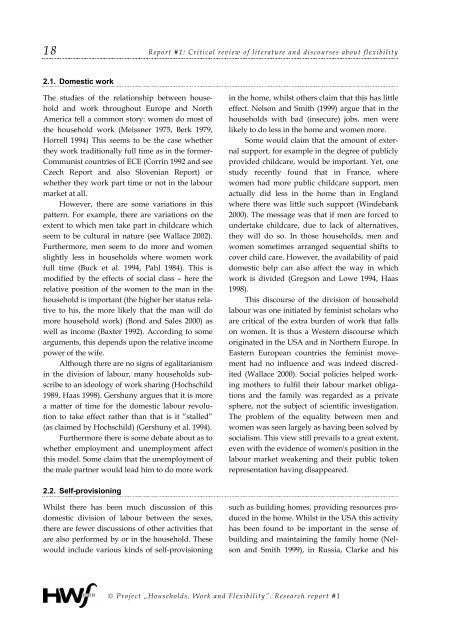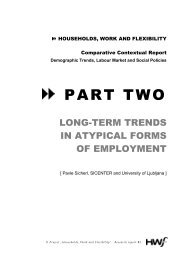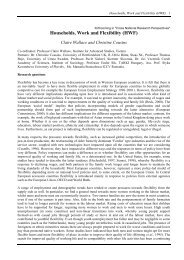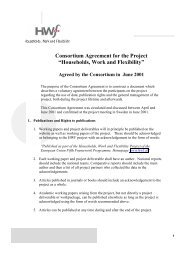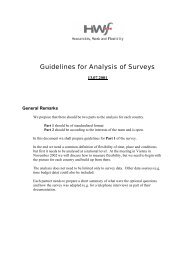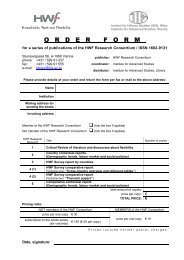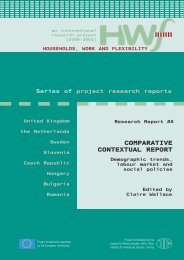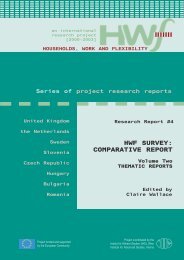CRITICAL REVIEW OF LITERATURE - HWF
CRITICAL REVIEW OF LITERATURE - HWF
CRITICAL REVIEW OF LITERATURE - HWF
You also want an ePaper? Increase the reach of your titles
YUMPU automatically turns print PDFs into web optimized ePapers that Google loves.
18 Report #1: Critical review of literature and discourses about flexibility2.1. Domestic workThe studies of the relationship between householdand work throughout Europe and NorthAmerica tell a common story: women do most ofthe household work (Meissner 1975, Berk 1979,Horrell 1994) This seems to be the case whetherthey work traditionally full time as in the former-Communist countries of ECE (Corrin 1992 and seeCzech Report and also Slovenian Report) orwhether they work part time or not in the labourmarket at all.However, there are some variations in thispattern. For example, there are variations on theextent to which men take part in childcare whichseem to be cultural in nature (see Wallace 2002).Furthermore, men seem to do more and womenslightly less in households where women workfull time (Buck et al. 1994, Pahl 1984). This ismodified by the effects of social class – here therelative position of the women to the man in thehousehold is important (the higher her status relativeto his, the more likely that the man will domore household work) (Bond and Sales 2000) aswell as income (Baxter 1992). According to somearguments, this depends upon the relative incomepower of the wife.Although there are no signs of egalitarianismin the division of labour, many households subscribeto an ideology of work sharing (Hochschild1989, Haas 1998). Gershuny argues that it is morea matter of time for the domestic labour revolutionto take effect rather than that is it “stalled”(as claimed by Hochschild) (Gershuny et al. 1994).Furthermore there is some debate about as towhether employment and unemployment affectthis model. Some claim that the unemployment ofthe male partner would lead him to do more workin the home, whilst others claim that this has littleeffect. Nelson and Smith (1999) argue that in thehouseholds with bad (insecure) jobs, men werelikely to do less in the home and women more.Some would claim that the amount of externalsupport, for example in the degree of publiclyprovided childcare, would be important. Yet, onestudy recently found that in France, wherewomen had more public childcare support, menactually did less in the home than in Englandwhere there was little such support (Windebank2000). The message was that if men are forced toundertake childcare, due to lack of alternatives,they will do so. In those households, men andwomen sometimes arranged sequential shifts tocover child care. However, the availability of paiddomestic help can also affect the way in whichwork is divided (Gregson and Lowe 1994, Haas1998).This discourse of the division of householdlabour was one initiated by feminist scholars whoare critical of the extra burden of work that fallson women. It is thus a Western discourse whichoriginated in the USA and in Northern Europe. InEastern European countries the feminist movementhad no influence and was indeed discredited(Wallace 2000). Social policies helped workingmothers to fulfil their labour market obligationsand the family was regarded as a privatesphere, not the subject of scientific investigation.The problem of the equality between men andwomen was seen largely as having been solved bysocialism. This view still prevails to a great extent,even with the evidence of women's position in thelabour market weakening and their public tokenrepresentation having disappeared.2.2. Self-provisioningWhilst there has been much discussion of thisdomestic division of labour between the sexes,there are fewer discussions of other activities thatare also performed by or in the household. Thesewould include various kinds of self-provisioningsuch as building homes, providing resources producedin the home. Whilst in the USA this activityhas been found to be important in the sense ofbuilding and maintaining the family home (Nelsonand Smith 1999), in Russia, Clarke and his© Project „Households, Work and Flexibility”. Research report #1


